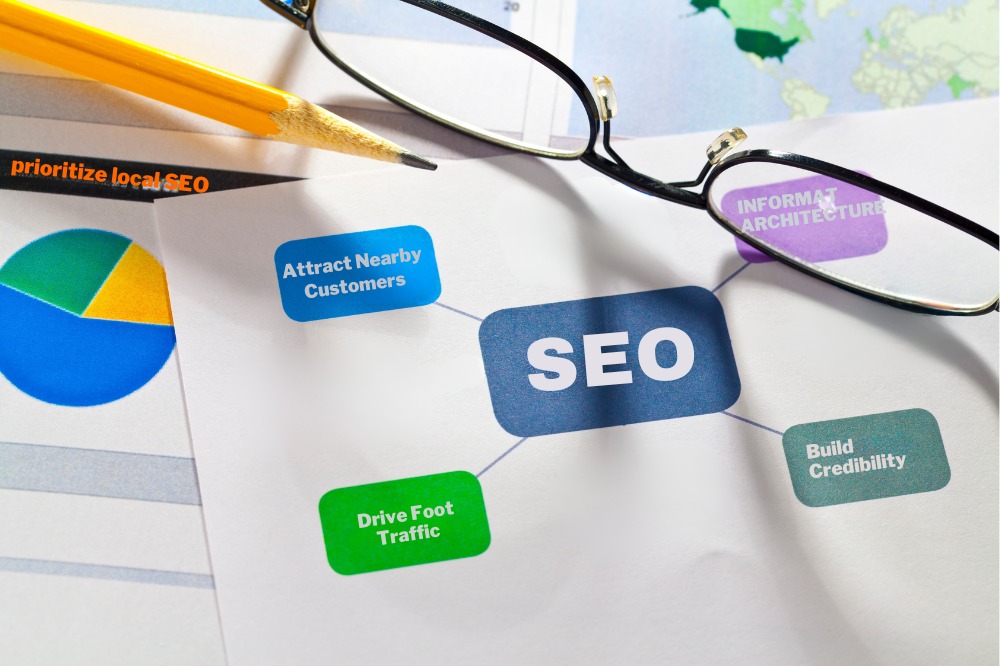Local SEO is essential for small businesses looking to attract nearby customers and increase their visibility online.
It ensures your business ranks in location-specific searches, leading to more foot traffic and higher sales.
This post will explore effective web design and content strategies to boost your local SEO efforts.
What Is Local SEO, and Why Is It Important?
Local SEO involves optimizing your online presence to rank higher in location-based searches. When customers search for services or products “near me,” local SEO ensures your business stands out.
Why prioritize local SEO?
- Attract Nearby Customers: Directly connect with people searching for your services locally.
- Drive Foot Traffic: Boost visits to your physical store.
- Generate Local Leads: Increase inquiries and sales within your community
- Build Credibility: Establish trust by ranking in local search results.
For small businesses, focusing on local SEO can significantly accelerate growth. If you’re looking for actionable steps, explore our guide on 10 Local SEO Tips to Boost Your Rankings Quickly for immediate improvements.
Web Design Strategies for Local SEO
Make Your Website Mobile-Friendly
With the majority of local searches happening on mobile devices, having a responsive website is non-negotiable. A mobile-friendly website design ensures your site functions seamlessly on all screen sizes, improving user experience and boosting your rankings. Test your website across various devices to guarantee smooth navigation and functionality for every user.


Boost Loading Speeds
Key benefits of fast loading speeds:
- Improved user experience with minimal delays.
- Increased session duration as users stay on your site longer.
- Better search engine rankings, as speed is a key ranking factor.
Use Location-Specific Keywords
Targeting the right keywords is essential for connecting with local audiences. Incorporate city names or regional identifiers into page titles, meta descriptions, and headings. For example, a bakery could use keywords like “Artisan Bread in Brooklyn” or “Brooklyn Fresh Pastries.” This helps search engines understand your geographical focus and makes it easier for customers to find you.
For detailed keyword integration tips, check out How to Optimize Your Website for Local SEO.


Leverage Schema Markup
Integrate Google Maps


Design with Navigation in Mind
Your website should be easy to navigate, with clear menus and logical layouts guiding visitors to essential information.
Focus on:
- Prominent call-to-action buttons like “Book Now” or “Contact Us.”
- Organized menus that help users find key services quickly.
- Simple design that eliminates unnecessary clutter.
Secure Your Site with SSL

Choose Reliable Web Hosting for Optimal Performance
A reliable cheap web hosting service ensures your website loads quickly, minimizes downtime, and enhances user experience. By selecting a hosting provider with strong uptime, fast loading speeds, and excellent customer support, you enhance your site’s performance and SEO rankings. Look for hosting solutions that offer optimized servers for speed and security to ensure you’re providing the best possible experience for your local audience.
Content Strategies to Dominate Local SEO
Publish Geo-Specific Blog Posts
Engage your local audience by creating blog content relevant to your area. For example, a gym could publish a blog titled “5 Best Outdoor Workout Spots in Seattle.” By addressing local interests and events, you enhance your connection with your community while boosting your SEO relevance for location-specific searches.
For inspiration on crafting high-performing local content, consider 5 Ways to Improve Your Local SEO Rankings.
Showcase Customer Testimonials and Reviews
Create Comprehensive FAQ Pages
Leverage Local Keywords in Content
Use Multimedia with Local Relevance
Write Seasonal Content
Integrate Local Keywords in Content
Encourage Action with Tailored CTAs
Conclusion
Mastering local SEO is crucial for small businesses to boost visibility, attract local customers, and foster growth. By combining web design strategies like mobile optimization and fast loading speeds with content tactics such as geo-targeted blog posts and customer reviews, businesses can create a strong online presence. Focusing on consistency, user experience, and local relevance helps improve search rankings and build trust, ensuring long-term success in a competitive market.
Focusing on consistency, user experience, and local relevance helps improve search rankings and build trust, ensuring long-term success in a competitive market. For a deeper dive, explore The Way Ahead for Local SEO in 2025 to stay ahead in an evolving digital landscape.





